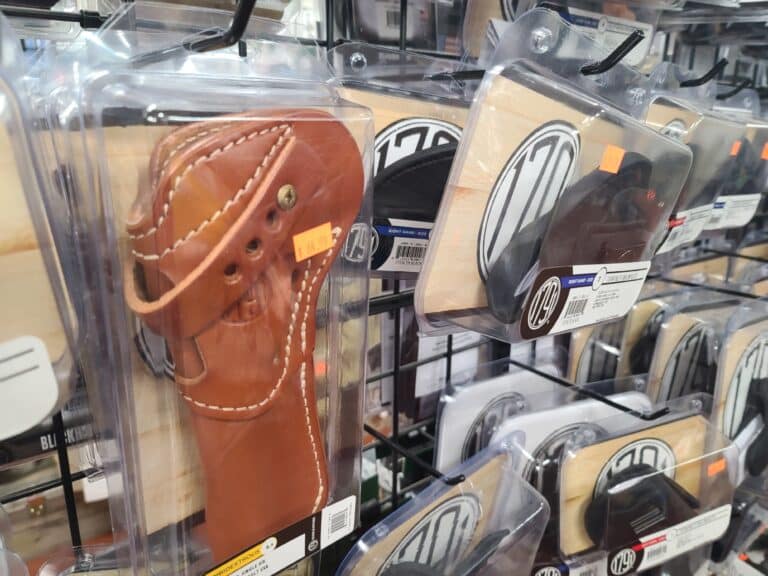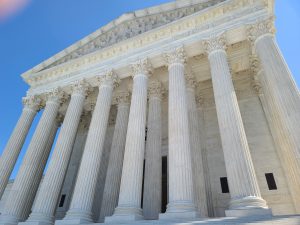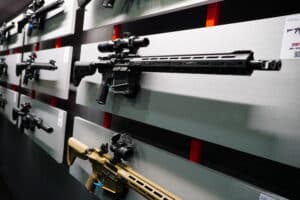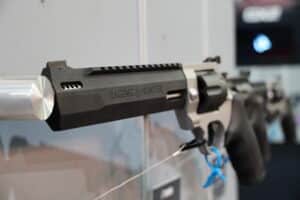The Empire State has made it harder than ever to legally carry a gun.
On Wednesday, Governor Kathy Hochul (D.) signed a series of new restrictions on where licensed carriers can take their guns and who can get a license in the first place. She painted the new measures as a direct response to the Supreme Court’s landmark ruling in New York State Pistol and Rifle Association v. Bruen, which struck down a key provision of the state’s previous law.
“[T]he Supreme Court issued a reckless decision removing century-old limitations on who is allowed to carry concealed weapons in our state — senselessly sending us backward and putting the safety of our residents in jeopardy,” Hochul said in a statement. “Today, we are taking swift and bold action to protect New Yorkers.”
The move puts the state squarely back in the crosshairs of gun-rights activists who want to take it right back to the high court. The collection of new restrictions will serve as test cases for feeling out the new limits of gun-carry regulation in the wake of Bruen. The more aggressive restrictions could serve as easier targets for those activists and have greater potential to set new Supreme Court precedents expanding the scope of recognized Second Amendment protections.
Government officials, who can no longer subjectively deny permits based on whether they think an applicant has “proper cause” for one, will be allowed to subjectively deny applicants based on their social media activity and “moral character.” Those who do obtain a permit will be barred from carrying on private property unless the owner posts a sign allowing it and anywhere the state has declared a “sensitive place,” including Times Square and several blocks around it.
The Supreme Court has already cast doubt on the constitutionality of those restrictions in their Bruen decision. Despite Governor Hochul’s claim the state only passed the new restrictions “after a close review of the NYSRPA vs. Bruen decision and extensive discussions with constitutional and policy experts, advocates, and legislative partners,” she has repeatedly made comments suggesting the laws are in direct conflict with the will of the Court.
A concurrence from Justices John Roberts and Bret Kavanaugh said requiring permitting for gun carry based on objective standards, including a background check or training requirement, was presumptively constitutional.
“Going forward, therefore, the 43 States that employ objective shall-issue licensing regimes for carrying handguns for self-defense may continue to do so,” they said. “Likewise, the 6 States including New York potentially affected by today’s decision may continue to require licenses for carrying handguns for self-defense so long as those States employ objective licensing requirements like those used by the 43 shall issue States.”
However, it also noted that challenges based on how those objective standards are applied in practice are still viable.
“As petitioners acknowledge, shall-issue licensing regimes are constitutionally permissible, subject of course to an as-applied challenge if a shall-issue licensing regime does not operate in
that manner in practice,” the pair wrote.
The new law doubles down on the subjective “good moral character” clause and also appears to be denying applicants a speedy decision on whether they qualify. During her Monday press conference, Hochul said new gun-carry permit applications would be delayed for an extended period of time well beyond the usual thanks to the new law.
“It could take months. It could be three months, a year,” she said.
Additionally, Hochul has publicly noted the state’s new restrictions are intended to massively expand what areas are considered off limits to legal carry. When asked by reporters last month where licensees would actually be able to take their guns under the new restrictions if or when they get a permit, she responded, “probably some streets.”
In Bruen, the Court rejected the idea New York could merely extend the presumptively-constitutional prohibition on carrying in “sensitive places” to large swaths of the state.
“[E]xpanding the category of ‘sensitive places’ simply to all places of public congregation that are not isolated from law enforcement defines the category of ‘sensitive places’ far too broadly,” Justice Clarence Thomas wrote for the majority. “Respondents’ argument would in effect exempt cities from the Second Amendment and would eviscerate the general right to publicly carry arms for self-defense that we discuss in detail below. Put simply, there is no historical basis for New York to effectively declare the island of Manhattan a ‘sensitive place’ simply because it is crowded and protected generally by the New York City Police Department.”
New York has notched an early legal win, though, with a federal judge dismissing a Gun Owners of America lawsuit seeking to block enforcement of the law before it goes into effect on Thursday.
“The court dismissed the case and denied the motion for a preliminary injunction,” Hochul said in a statement. “It is a just and right decision, and our smart, sensible gun laws will go into effect as planned tomorrow on September 1 to keep New Yorkers safe.”
However, the win may prove to be fleeting given District Judge Glenn Suddaby’s reasoning. He argued on the merits the scales would “tip” in favor of the “granting Plaintiffs’ motion” for an injunction if “they had standing,” which he argued they did not because of the specific plaintiffs who brought the case.
“After carefully considering the matter, the Court finds that Plaintiffs have made a strong showing that balance of equities tips in their favor and that the public interest would not be disserved by the Court’s granting of their requested relief for the reasons stated in their memoranda of law,” Suddaby wrote.
He argued an injunction against the law would likely be successful if brought by a different New Yorker.
“[At the end of the day, however, the undersigned is left with a strong sense of the safety that a licensed concealed handgun regularly provides, or would provide, to the many law-abiding responsible citizens in the state too powerless to physically defend themselves in public without a handgun (in no small part to the doubt cast into the would-be perpetrator’s mind about whether this one, in this concealed-carry state, might be armed),” he said. “These include senior citizens, disabled people, and those who work late at night, especially in a city.”
Still, the dismissal means New York’s restrictions will remain in place for at least long enough for another challenge to be brought.







Only Members can view comments. Become a member today to join the conversation.